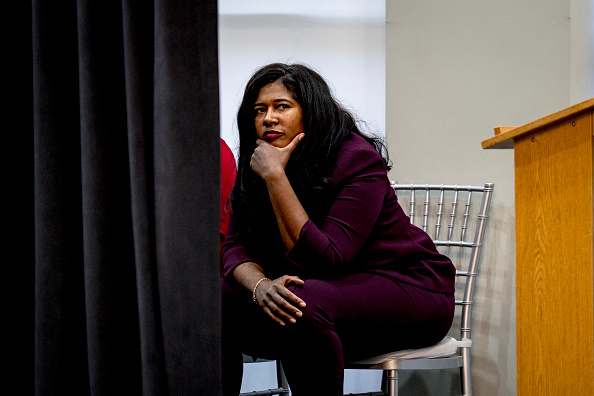Last month, Republican nominee for Michigan secretary of state Kristina Karamo filed a lawsuit asking a judge to require Detroit residents to either vote or obtain their absentee ballots in-person, a move that could potentially invalidate tens of thousands of ballots. A Wayne County judge blocked the request on Monday in a fiery rebuke against Karamo and the other plaintiffs.
The Trump-endorsed nominee filed the suit in Wayne County Circuit Court alongside five other plaintiffs and the Election Integrity Fund and Force, a local nonprofit which sought to “decertify the Michigan 2020 election.” Detroit City Clerk Janice Winfrey and the city’s board of election inspectors were listed as defendants.
The suit aimed to disband the city’s absentee voting counting boards (AVCB), which tallies absentee ballots at a convention center in Detroit. The plaintiffs claimed that the system was “plagued with many problems” which “created controversy” over the 2020 election, presenting twelve such “problems,” claiming the ACVB violated Michigan state law.
Wayne County Circuit Court Chief Judge Timothy Kenny ruled Monday that the allegations “are unsubstantiated and/or misinterpret Michigan election law,” and that ruling in the plaintiffs’ favor would “egregiously harm” eligible voters in Detroit.
By the time the suit was filed, he notes, absentee voting had been in effect since late September, and about 60,000 ballots had already reached the Detroit city clerk. “The preliminary injunction would serve to disenfranchise tens of thousands of eligible voters in the city of Detroit,” he wrote. “Additionally, the city of Detroit”—which is 77% Black—”would be the only community in Michigan to suffer such an adverse impact.” Such an impediment would’ve been “not only unprecedented,” he wrote, but also “intolerable” and “incalculable.”
“The prejudice to the city of Detroit, and by extension the voters who have submitted absentee ballots, is enormous,” the judge wrote.
Detroit was singled out in the Karamo suit because it was a touchpoint for election deniers to stir up baseless allegations of voter fraud . Trump repeatedly made false claims about turnout in the city to bolster his claim that the 2020 election was stolen from him. Soon after Election Day, he claimed that bad actors were dumping ballots at the ACVBs to turn the election for Biden, even after former attorney general William Barr explained that the ballots were being delivered from over 600 precincts, “so the normal counting process would involve boxes coming in at all different hours.” Trump also claimed that “139%” of Detroit turned out to vote; in reality, only 51% of eligible Detroit voters showed up to the polls that year.
Karamo’s lawsuit also cited “2000 Mules,” a debunked propaganda film by conservative man-about-town Dinesh D’Souza that’s been at the center of multiple scandals in recent weeks, as evidence of illegal election activity in Detroit. The film claims that “ballot mules” were hired by shadowy nonprofits to deposit fake ballots in drop boxes in several swing states during the 2020 election.
The documentary claimed that various Detroit voters “violated the law by dropping off multiple ballots at a time” during the 2020 election. What the film, and subsequently Karamo’s lawsuit, failed to mention was that Michigan state law allows for voters to deliver ballots for immediate family or household members without penalty.
In his ruling, Kenny also pointed out that the timing of the lawsuit was suspicious. “The present case represents the quintessential example of the application of the laches doctrine,” meaning that an unreasonable amount of time has passed since the incidents occurred to file a claim.
Karamo’s camp “sat on their hands for months” before filing a complaint about the August 2022 primary, the judge said, and the relief would potentially harm tens of thousands of voters. “This is unacceptable and cannot be permitted.”
“Plaintiffs have raised a false flag of election law violations and corruption concerning Detroit’s procedures for the November 8th election,” he concluded before dismissing the case. “This Court’s ruling takes down that flag.







Frist
BAM!
(Hey, Discobot…what is ambiguous about that complete sentence?!?)
It’s near psychotic in concentrated derp. Beyond that…other people can describe it better.
Black woman seeks to disenfranchise Black voters. If she were Irish she would have joined the Black and Tans.
Too many black people be counting them ballots in Detroit